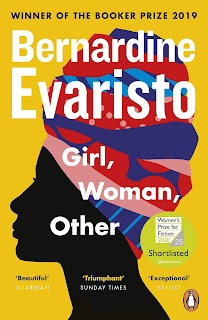Girl, Woman, Other by Bernadine Evaristo
The book opens with Amma, a renowned lesbian playwright, at the opening night of her latest work at the National Theatre. We're then introduced to her daughter, an ambitious student called Yazz who would rather Amma ditched her bleached dreadlocks and patterned harem pants and bought her clothes from M&S like other mothers, and her former business and creative partner, Dominque, who now lives in America after a disastrous relationship with a coercive and controlling older woman. There's also Carole, who after a traumatic incident in her youth has risen to become a successful city banker, but now finds herself distanced not only from her former friends on her old council estate but also from Bummi, her mother - who furiously insists that Carole must overcome her homesickness and keep her place at Oxford, only to find that this means her daughter becomes someone who no longer looks or sounds like her. There's also Shirley, the teacher who championed Carole, at school, who also happens to be an old friend of Amma's and - well, you get the picture. The whole novel is like a chain of lives, one leading to another and sometimes doubling back.
All the women's lives are connected in one way or another, and the ways their stories intersect are cleverly devised and revealing. When I read novels like this, that consist of separate characters' narratives with a loose connection between them, I often feel they would have worked perfectly well as short stories and that the links are too tenuous to matter, but that wasn't the case here. The overlaps between the characters' lives not only provide cohesion but also highlight both the differences between the characters, and the common experiences that unite them as black women living in Britain. There is no real overarching plot as such, although the book is no less enjoyable for that and I enjoyed its conclusion.
Bernadine Evaristo is a poet as well as a novelist and that's clearly apparent in Girl, Woman, Other. It's written almost as a prose-poem, with line breaks instead of full stops and carefully placed, arresting pauses which lend an extra layer of meaning. That doesn't mean it's difficult, though - far from it. The language is clear and accessible and often funny, the characters' voices are distinct and if anything, its style makes it an easier read than many. There's also something quite immersive about it: the stylistic elements, rather than distancing the reader from the characters, seem to drop you straight into their world.
The scope of this novel is huge, taking in race, feminism, sexuality, motherhood, marriage, social history and more, but that doesn't take away from the personal stories of the characters as individuals. Having heard Evaristo reading from her memoirs on the radio recently, I can see that there are autobiographical elements to some of the characters' stories, and perhaps those are the characters that come across most strongly, but thanks to the bold vibrancy of Evaristo's writing, none of the characters feel as if they're just there to personify a particular issue or question. One of Girl, Woman, Other's biggest strengths is that each character's life seems utterly real.

Comments
Post a Comment